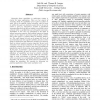95
Voted
AAAI
2000
15 years 4 months ago
2000
A central problem in qualitative reasoning is understanding how people reason about space and shape with diagrams. We claim that progress in diagrammatic reasoning is being slowed...
MAICS
2003
15 years 4 months ago
2003
Introspection is a fundamental component of how we as humans reason, learn, and adapt. However, many existing computer reasoning systems exclude the possibility of introspection b...
143
click to vote
ICAI
2003
15 years 4 months ago
2003
Reasoning about capabilities in multi-agent systems is crucial for many applications. There are two aspects of reasoning about the capabilities of an agent to achieve its goals. O...
140
Voted
IAAI
2003
15 years 4 months ago
2003
Sketch maps are an important spatial representation used in many geospatial reasoning tasks. This paper describes techniques we have developed that enable software to perform huma...
134
click to vote
DLOG
2003
15 years 4 months ago
2003
This chapter covers extensions of the basic description logics introduced in Chapter 2 by very expressive constructs that require advanced reasoning techniques. In particular, we ...
146
Voted
CLIMA
2004
15 years 4 months ago
2004
The aim of this work is the design of a framework for the revision of knowledge in abductive reasoning agents, based on interaction. We address issues such as: how to exploit knowl...
103
Voted
AIML
2004
15 years 4 months ago
2004
In this paper we give the notion of modularity of a theory and analyze some of its properties, especially for the case of action theories in reasoning about actions. We propose alg...
115
Voted
OWLED
2008
15 years 4 months ago
2008
Chemical Entities of Biological Interest (ChEBI) is a database and ontology that represents biochemical knowledge about small molecules. Recent changes to the ontology have created...
109
Voted
IJCAI
2007
15 years 4 months ago
2007
Using the achievements of my research group over the last 30+ years, I provide evidence to support the following hypothesis: By complementing each other, cooperating reasoning pro...
108
Voted
COMMA
2008
15 years 4 months ago
2008
Abstract. The identification of consistent sets of arguments is one of the most important concerns in the development of computational models of argument. Such extensions drive the...


